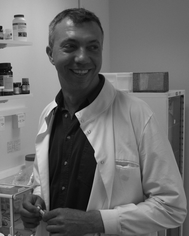SciSoc Spotlight Issue 6 – Dr Martin Welch
26 October 2020. Dr Welch is with the Department of Biochemistry, School of Biological Sciences. A PDF version of this Issue is available here.Research focus: Microbial physiology and metabolism
Our main aim is to understand better the physiology and metabolism of a nasty opportunistic human pathogen called Pseudomonas aeruginosa. Most people have never heard of it, but it has the dubious accolade of having recently been designated by the WHO as a “critical priority pathogen” against which new antimicrobial interventions are urgently needed. Our role in all this? We try to identify “weak points” in the biology of the organism that can be targeted by antimicrobial agents. A particular focus of the lab is to look into how cells within a population of the bug communicate with one another (and yes, just like us, they do “chat” with one another using chemical signals, about things like war (on the host) and environmental affairs), and what they eat. It turns out that by blocking these areas of the bug’s physiology, it either dies or becomes much less harmful.
What made you decide to pursue research?
So what drew me into this area of research? I’d like to claim a childhood passion or suchlike, but the reality is that like any young boy, I preferred tree climbing (at an early age), and later, as a teenager, the opposite sex. In fact, it was largely the latter that determined my career path – one cannot underestimate the impact that domestic considerations have on career trajectories, and if you want a nice, balanced life, this is perfectly reasonable. Anyway, from my PhD onwards I became fascinated by how bugs sense and respond to the world around them. My career path has allowed me to live in other countries for extended periods, while, at the same time, also engaging in some really interesting Science.
What would be your advice to aspiring researchers?
So, do I have any advice for anyone considering a career path in science? Yes. If you never want another dull moment again, get your brain in gear and get thinking. If your main goal in life is to see how “United” do in the match this weekend, you’re not cut out for a life in Science. A 9-5 “job” it is not…. you have to be genuinely enthused by the world around you, and have genuine curiosity (and ideally, also a well-stocked bookshelf – have you ever met an interesting person who does not read voraciously?). However, if you go to bed thinking about “how things work”, this may be the job for you. For me, the journey is as rewarding as the destination, and I never get up on a morning dreading the day ahead; quite the opposite – every day is an amazing day. What a privilege!Trackback from your site.

